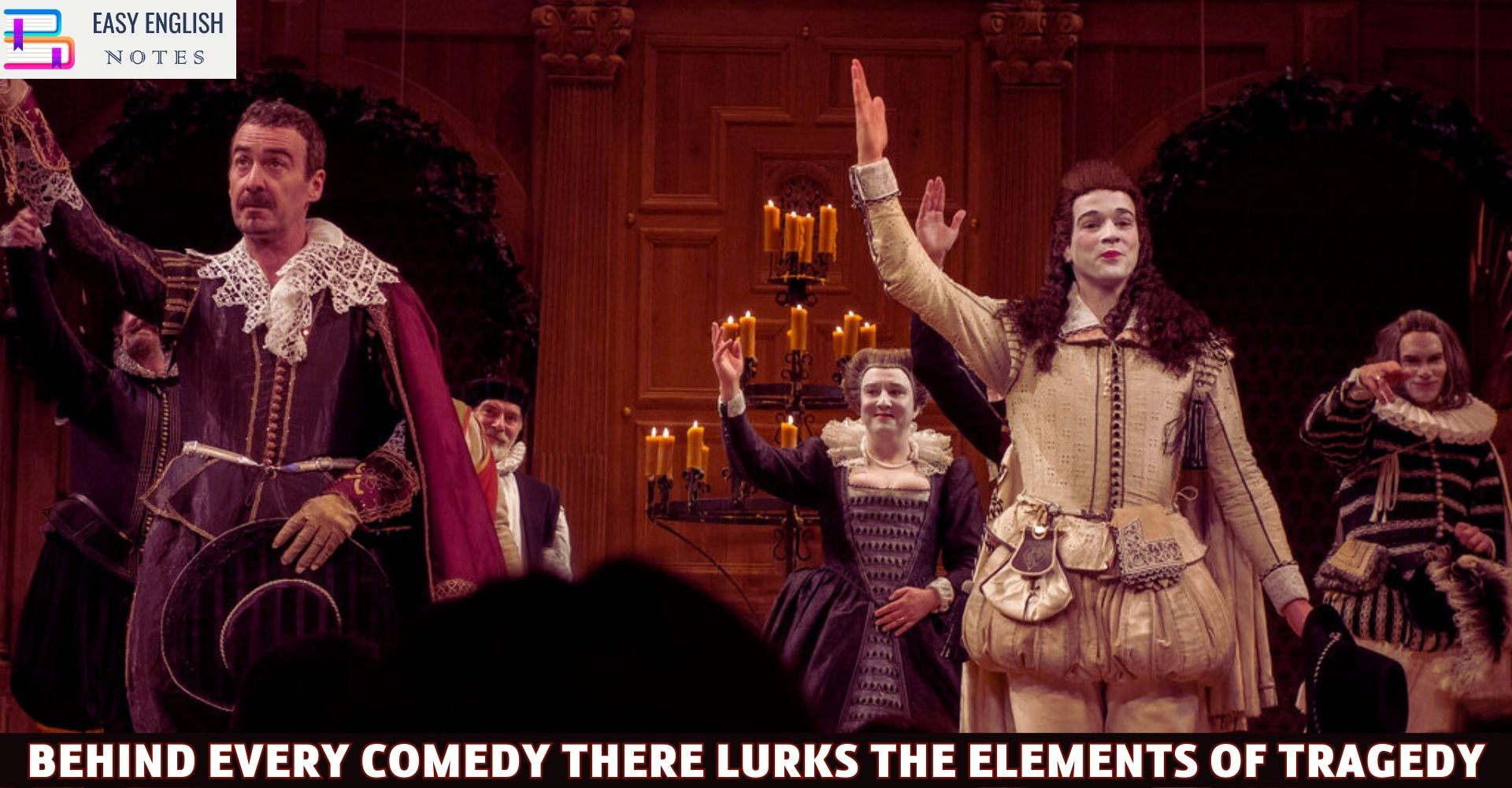In the realm of existence, the blend of comedy and tragedy mirrors the complexities of life itself. Shakespeare, in his dramatic works, mirrored the essence of life. This is precisely why Shakespearean comedies often intertwine with elements of tragedy. As he astutely noted, “Our sincerest laughter is fraught with some pain.” The shadow of death and distress casts itself upon the sunlight of life, for a life devoid of shadows would be no life at all, especially human life.
There are aspects that tickle the laughter of the common folk but inflict pain upon sensitive and cultured minds. Take, for instance, the case of Malvolio, a Puritan who fails to find amusement in the unparalleled wit of Feste and the entire comedy. While Sir Toby and his cohorts perceive the torment of Malvolio in the dark room as comedic, it is, in truth, tragic for the head steward. The plotters, in their mockery of Malvolio, push the boundaries too far, even reaching a point where they themselves contemplate putting an end to it. Malvolio’s character lacks any comic elements because he serves as a buzzkill, out of sync with individuals like Sir Toby, Maria, Feste, and Fabian, all of whom stand against him. While Malvolio deserves some form of punishment for his intolerance, lack of humor, and failure to embrace the art of life due to his excessive self-love, the punishment he receives appears excessively severe for his shortcomings. Ultimately, in the final scene, Malvolio succumbs in an uneven battle, vowing revenge on his persecutors for the incessant abuse he endured. The tragedy of Malvolio arises from his misfit status within the cheerful company of revelers in Illyria. Thus, it becomes evident that the entire episode involving Malvolio is not truly conceived in the spirit of comedy but rather tragedy. Shakespeare himself acknowledged the tragic implications of this episode, as reflected in the alternative title he gave the play, “Twelfth Night, or What You Will.”
Another instance where comedy and tragedy intertwine in the play is the duel scene, which serves as the climax of the comedic subplot centered around Sir Andrew. We find ourselves despising Sir Andrew more than we do the contemptible Malvolio because Sir Andrew possesses no redeeming qualities. We laugh at him until his foolishness, absurdity, and incompetence become almost painful to witness. The duel between Sir Andrew and Viola is designed to embody the essence of top-notch comedy, featuring a cowardly knight facing off against a trembling girl. However, during the actual duel, both knights, Sir Toby (the instigator) and Sir Andrew (the victim), receive more than they bargained for from Sebastian, who skillfully handles every situation, whether it’s dispatching the Clown, utilizing his fists against Sir Andrew, or employing his sword against Sir Toby. In the final scene, both knights bear broken limbs as a result of their encounter. The earlier comedic atmosphere of the subplot, of which the duel scene serves as the pinnacle, dissipates and gives way to tragedy, although the dramatist attempts to alleviate the gloom by portraying Sir Toby as heavily intoxicated and indifferent to the severity of his injuries inflicted by Sebastian.
Also Read :
- Compare Hamlet with Macbeth, Othello and other Tragedies
- “The Pardoner’s Tale” is the finest tale of Chaucer
- Prologue to Canterbury Tales – (Short Ques & Ans)
- Confessional Poetry – Definition & meaning
Tragic elements also find their place within the play. Orsino’s love, for instance, contains a tragic undertone, plunging him into bitter disappointment and melancholy. Viola’s love story is equally tinged with tragedy. Had she succeeded in her mission with Olivia, her life would have been plagued by grief, mirroring that of her fictitious sister. Olivia’s unrequited love for Cesario (Viola) holds its own share of tragedy. Viola, fully aware of the agony of unreciprocated love, finds no amusement in Olivia’s mistake.
Had it not been for Sebastian’s timely arrival, the play would have concluded in tragedy. Until that moment, the narrative teeters on the precipice of tragedy. Through his masterful craftsmanship, Shakespeare skillfully averts the tragic consequences by orchestrating Sebastian’s marriage to Olivia.
Indeed, the underlying message of “Twelfth Night” echoes the teachings Shakespeare imparted in another play, “As You Like It”: the sweetness derived from adversity. With the exception of Malvolio, nearly all the characters grasp this profound lesson. Malvolio emerges from his dark confinement unchanged, remaining as self-centered as ever. Adversity, symbolized by his time spent in the dark room, fails to teach him the essence of life or cure his overwhelming self-conceit. However, both knights receive a severe thrashing from Sebastian as retribution for their “notorious abuse” of Malvolio. It is worth noting that while Sir Toby treats his injuries with lightheartedness, his companion Sir Andrew exhibits penitence and a newfound wisdom. He declares, “I would rather be back home than have forty pounds.”
Viola, thrown ashore on the Illyrian coast and faced with misfortune, courageously confronts her adversities alone. Through quick decision-making, strategic planning, unwavering confidence, honor, loyalty, and a sense of duty, she manages to rebuild her life. Her misfortunes act as the forge that tempers her resilient spirit. Count Orsino and Olivia, too, learn their respective life lessons. In the end, Shakespeare seems to convey the message that those who weep shall be blessed, for time will eventually dry their tears and transform grief into joy, tragedy into comedy.
PLEASE HELP ME TO REACH 1000 SUBSCRIBER ON MY COOKING YT CHANNEL (CLICK HERE)











